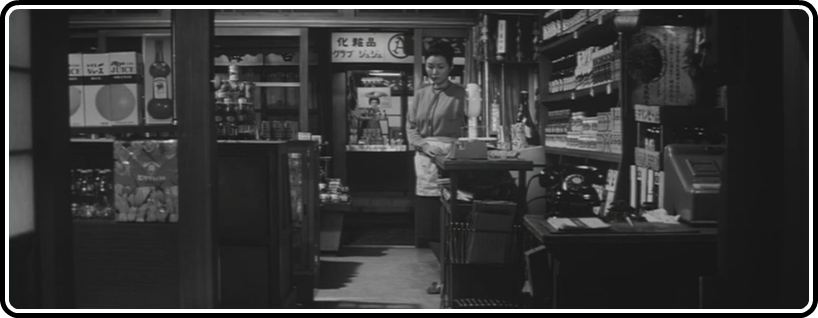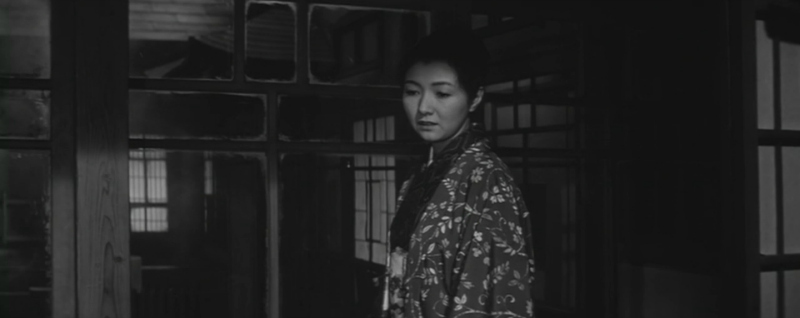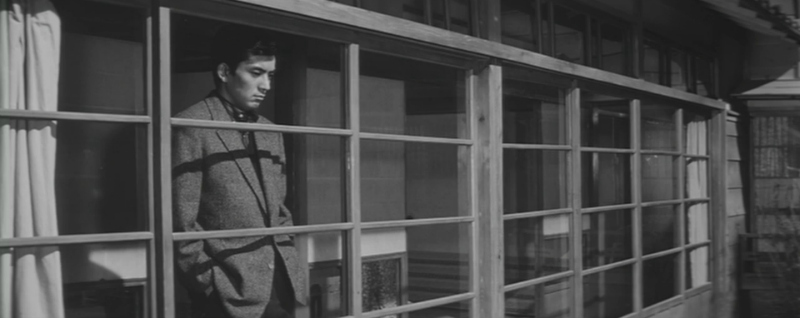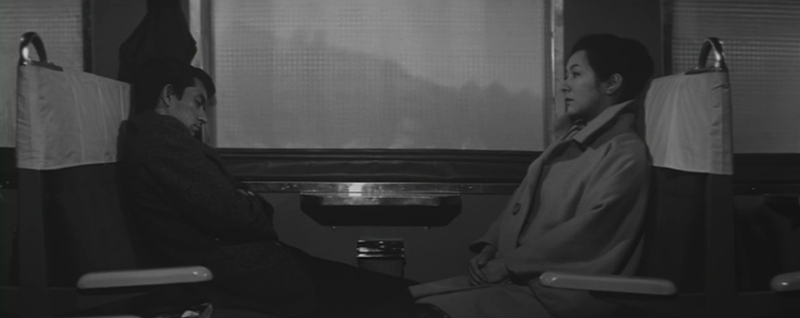
During the most recent episode of The Eclipse Viewer, on which David and Robert were kind enough to invite me, we discussed the role modernity played in Mikio Naruse’s silent films, as an oppressive, insistent, indifferent, and ever-evolving force, typically taking the form of massive vehicles running into our beloved characters. It was, admittedly, something of a contrived melodramatic plot-device-as-metaphor, but it speaks to the ongoing concern of modernity, both outward and inward, in Naruse’s films to come. By the time we reach 1964’s Yearning, Japan (even a small town outside of Tokyo, where this takes place) seems fully modernized – Naruse’s camera emphasizes the slick surfaces and bright lights, even as it gazes longingly at the remnants of history that have not yet been paved over. Similarly, his characters clutch tightly to the past as they adapt themselves to their brave new world.
The film opens with a large bus, reminiscent of the ominous campaign vehicle in Robert Altman’s Nashville, blaring out promotion to the benefit of the local supermarket, which is celebrating its first anniversary by offering everything at 50% off. As with Altman, the bus is something of an enemy, something to fear. We see it drive past the stalwart mom-and-pop shops, and the expressions of their proprietors cement our instinct – that the supermarket spells their doom. Chiefly, we come to fear most for Reiko (Hideko Takamine), who has spent the past eighteen years building up a shop she doesn’t even own. Her husband was killed during World War II, six months into their marriage, but she has nonetheless slaved for his family’s shop, determined at once to honor his memory and carve out a life for herself.

But things are coming to a head. Reiko’s brother-in-law, Koji (Yuzo Kayama), is now in his twenties, well past the point at which he’s expected to start a life for himself. Though he spends his days loafing around, rejecting true commitment in spite of his working-class values (we see him get into a bar fight when he expresses disgust at the over-consumption in which nearby patrons indulge), he leaps at the chance to transform his family’s shop into a supermarket, their only hope of competing in their surroundings. But he’ll only agree to it if Reiko is assured an executive position, a notion the family rejects because of what it could mean should she ever re-marry – suddenly their shares would be split even thinner, and they could lose control altogether. There’s little question that she’s earned such a title, but much graver doubts that it’d be best for the company, or even the family.
And this is all without getting into Koji’s hidden, but plainly obvious, personal motivations for enhancing Reiko’s position, and thus keeping her around.
By 1964, Naruse had hit a stride that’s probably no longer even possible in the industrial structure of modern filmmaking, having directed more than eighty films beginning in 1930, allowing his stories and their morality to become even more complex even as his cinema becomes, in many ways, much simpler. While his silent work was full of dizzying, kaleidoscopic sequences and aggressive camera movement, and he experimented with contrasting background and foreground in his 1950s films, Yearning is a much more crisp affair. One never wonders where to look onscreen, nor harbors any concerns that anything might be missed. His framing and staging is elegant, make no mistake, and here, that mission feels like an expression of the linearity of thought with which Koji and, especially, Reiko are struggling.

The lingering effects of World War II are all over Naruse’s postwar work, with an insistence that can, to modern audiences, seem a tad abrasive, but it always felt to me to be an honest expression of a genuine tension in the air; an unspoken phantom. This is one of the rare instances in his films in which that’s expressed through war’s most obvious and immediate wound – the dead. We know almost nothing of Reiko’s late husband, as indeed Reiko really didn’t. They were married very quickly before the war began, and he died very shortly into his tour. His presence is, largely for her and entirely for the audience, defined by a framed picture she carries of him in his uniform. That’s the man she knows, and the man to whom Koji must live up, not only as a son and brother but also a potential lover. Beyond the question of incest – though Koji and Reiko are not related by blood, they call each other “sister” and “brother” and have for nearly his entire life and almost half of hers known each other according to that status – Koji clearly carries doubt that he could ever live up to his brother’s indistinct, but nevertheless powerful, legacy in any sense of the word, especially in the rather delicate area of romance. Added to the assumed guilt over not being old enough to serve in the war, it’s little wonder that Kuji spends his days in parlors and his nights with assorted women.
There is, thus, little question of Reiko’s intentions as regard’s Kuji’s advances – resist and retreat. As much as various characters assert that this modern world is nothing like the one they remember from their youth, some things just never change, and marrying your dead husband’s brother is either long out of date (there’s an implication of property being passed down) or too progressive for society at this time. Kuji’s brazenness in even attempting a connection points to both his innate desire to cast off societal expectations, as well as his inherent male privilege – if people did start talking, it would be he about whom they’d speak. And lest one think that social considerations are just some personal hang-up, remember that they’re in the grocery racket. Remaining on good terms with their community is tantamount to their success.
Naruse builds to an ending so wrenching in its concept and deft in its execution, it actually made me gasp. With a simple formal choice, he anticipates decades of modernist endings to come, wrapping things up with a singular, simple image that tells the whole film’s story in just one look, beautifully captured. Time and time again Reiko reasserts that she has her whole life ahead of her, and in many ways, that’s true. She’s only in her mid-30s. She has many possibilities. But the ending recontextualizes that assertion, affirming the fact of it while reversing the sentiment. Reiko has her whole life ahead of her; what could be more tragic?

Shot in 2.35:1 (TohoScope!), Yearning is rendered very strikingly in HD on Criterion’s Hulu channel. The image is perhaps a little too smooth, too DNR-ed, but it is nevertheless crisp and satisfying. It might just be me, but there were so few films shot in black-and-white AND anamorphic widescreen that I just go nutty whenever I get the pleasure to watch one, never mind one as handsomely framed as this. Anyway, the simple pleasure of seeing these images even moderately well-rendered (certainly on par with an average DVD release, if not better) overcame my rather nit-picky issues of it not being terribly “film-like.”
And this, seriously, needs to get a Blu-ray release from Criterion. It’s easily the best film I’ve seen as a function of this series, and I’d nearly put it on par with When a Woman Ascends the Stairs, which to me is almost otherworldly in its perfection. It’s a slighter film, less immediately driven by story, but nudged along ever so by the changing times in a very resonant fashion. Not only would this look magnificent on Blu-ray, it would provide a much-needed revisit to Naruse’s work by the Collection, boosting his profile and providing supplementary material on the filmmaker that just isn’t out there.
In the meantime, I implore you to watch Yearning on Criterion’s Hulu channel. It is something of a masterpiece.



![Bergman Island (The Criterion Collection) [Blu-ray]](https://criterioncast.com/wp-content/uploads/2022/11/bergman-island-the-criterion-collection-blu-ray-400x496.jpg)
![This Is Not a Burial, It’s a Resurrection (The Criterion Collection) [Blu-ray]](https://criterioncast.com/wp-content/uploads/2022/11/this-is-not-a-burial-its-a-resurrection-the-criterion-collection-blu-ray-400x496.jpg)
![Lars von Trier's Europe Trilogy (The Criterion Collection) [The Element of Crime/Epidemic/Europa] [Blu-ray]](https://criterioncast.com/wp-content/uploads/2022/11/lars-von-triers-europe-trilogy-the-criterion-collection-the-element-of-400x496.jpg)
![Imitation of Life (The Criterion Collection) [Blu-ray]](https://criterioncast.com/wp-content/uploads/2022/11/imitation-of-life-the-criterion-collection-blu-ray-400x496.jpg)
![The Adventures of Baron Munchausen (The Criterion Collection) [4K UHD]](https://criterioncast.com/wp-content/uploads/2022/11/the-adventures-of-baron-munchausen-the-criterion-collection-4k-uhd-400x496.jpg)
![Cooley High [Criterion Collection] [Blu-ray] [1975]](https://criterioncast.com/wp-content/uploads/2022/11/cooley-high-criterion-collection-blu-ray-1975-400x496.jpg)